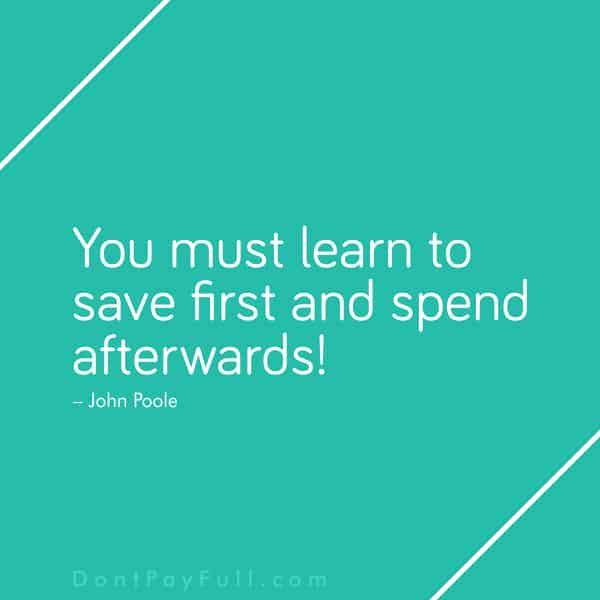The Most Common Problem
So you’ve just started working and you’re excited about earning your first paycheck!
Right as the cash lands in your bank account… you go on your spending spree.
This is the start of your financial journey.
I’m not gonna preach being extremely prudent with your spending or following a very common rule of saving 20% of your income.
Spend your money, you deserve it.
Go on holidays, buy the latest iPhone, whatever floats your boat (but don’t buy a boat).
This may seem contradictory from a personal finance blog but to me, a minimalistic lifestyle is spending money on things that truly brings value to your life.
This is different for every person.
I may think buying the latest iPhone brings value to me since I’m always on it, and that’s completely fine.
On the other hand, a drone would be super cool to have but that’ll only bring me joy for… 5 minutes.
These 4 things will help you get up and running on your journey to financial success:
- Save first, spend later
- Evaluating your purchases
- Don’t commit
- Apply for a credit card
- Save first, spend later
This is arguably the most important step to financial success.
While saving 20% of your income is an ideal number, it doesn’t necessarily have to be the case right off the bat.
Save a comfortable amount, automatically. I do this every month by setting up an auto-debit transaction for 2 of my investment vehicles, ASB Financing & Stash Away, right after my salary date (so end of month or start of the month).
Can’t save RM500? No worries! Save RM100. Save RM50. Save RM10. Just save, & save first.
Why save first?
I believe that we as human beings have the natural ability of survival. If you know you’re low on cash midway through the month, you’ll adjust your spending to make sure you can survive for the rest of the month.
The problem with not saving first is you don’t decide how much leftover you have at the end of the month (nearly always 0). Instead your spending determines savings.
If you save or “pay yourself first”, you’ve already allocated the savings right at the start, and you can spend the remainder of your money without worrying about your savings.
Start small, evaluate, and gradually increase. Make it automatic so you don’t have a decision to make.
- Evaluating your purchases

Spend within reason.
Yes, a BMW would probably bring value to your life, but that’s completely out of the picture for fresh grads.
Don’t starve yourself from spending too much as this will completely drain you out. Instead, allocate your spending towards things that’ll make you happy.
A good rule of thumb:
- Stop the impulse. Let it sit in your cart for a week and take the time to think through it. I’ve found this to help in stopping a lot of impulse buys (Airpods, I’m looking at you)
- Think about it this way — if someone were to offer you the item itself or its equivalent in cash, what would you take? In my case, I’d take the RM699. Easy decision, delete from cart.
- Don’t commit
You know when a friend invites you on a night out and you say – “We’ll see :)” “I’ll let you know!”, or the greatest – “Inshallah”. We say this when we don’t want to make a commitment.
Similarly, don’t make financial commitments right out the gate.
Remember, this is the start of your financial journey. Don’t end it.
Say “Inshallah” to the cars, the houses, the iPhone on installments. The only argument that can be made is for cars if absolutely needed to travel to work (no, a Honda is not absolute necessary).
Try to hold off long tenured commitments for as long as you can, you always want the flexibility and freedom of being able to drop RM5k to attend your sister’s graduation in Cardiff (yikes).
Now this is something controversial.
I’ve read many articles from personal finance bloggers who swear they’d never touch a credit card.
My personal advice – get one as soon as you can.
Why? Build your credit score, build your discipline.
If you’re worried about spending beyond your means, tell your bank to lower your credit limit.
Being disciplined to spend within your means is something that you will eventually have to do, so why not now.
Evaluate your purchases (Point 2), pay off your entire bill in full every month, and build your credit score. Having a good credit score is vital for bigger purchases later in life.
Side perks — cashback, discounts at eateries, and the chance to finally win my dream holiday on my millionth competition entry (damn you CIMB!)
This sums up my welcome kit to the start of your financial journey.
In my next posts, I’m thinking of diving a bit deeper into each individual investment vehicle, most probably starting with ASB.
Feel free to leave a comment on something YOU would like to learn more about!
Till then! 🙂
*Disclaimer: Everything on my blog is only my personal opinion. Always do your own research before making financial decisions.






A very convincing write up. If I were given the chance to lead a new life and I am in my early twenties now I would surely go your way. I suppose nothing is too late. Eagerly looking for your next posting.